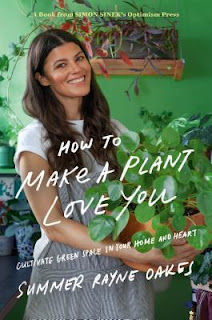When I first saw Summer Rayne Oakes' How to Make a Plant Love You, I was pretty intrigued. I love house plants and currently have about twenty in my space. But after recently losing a couple, I was thinking reading about better cultivating green space in my apartment might help me make sure my plants are happy.
How to Make a Plant Love You starts out by talking about the many benefits of plants for people, and how we are losing our connection to them (and nature in general) as we're migrating into cities. There is a lot of research that talks about how beneficial it is for us to be out in nature, or at the very least around plants. Oakes also talked about what cities like Singapore are doing to green the space in an attempt to make people healthier; I really want to go and see it now!
She also talks a bit about how plants function; this discussion reminded me of what was in The Soil Will Save Us (except that Kristin Ohlson's book goes into far more detail on the subject).
Unfortunately, the subtitle of How to Make a Plant Love You is a bit misleading; I found the book to be extremely light on the details of how to actually cultivate your own space and get plants to love you (beyond "do research to make sure the plant you like will actually like it in your place"). The few chapters on the subject really didn't have a lot to them; while giving a few very basic tips (consider light, soil, and water), Oakes talked more about what she has done in her own apartment and life. I'm sure you can adapt that to your own life if you'd like (and really, her main message is just to get started and bring a plant into your home). But if you already live with plants, this part of the book really brings nothing new.
How to Make a Plant Love You is ultimately a quick read though that does have some interesting tidbits. If you're curious about the benefits of plants within your home, definitely consider giving this a read. But if you've lived with plants for awhile (and researched them at all), you might want to give this one a pass.
Subscribe to:
Post Comments (Atom)

No comments:
Post a Comment